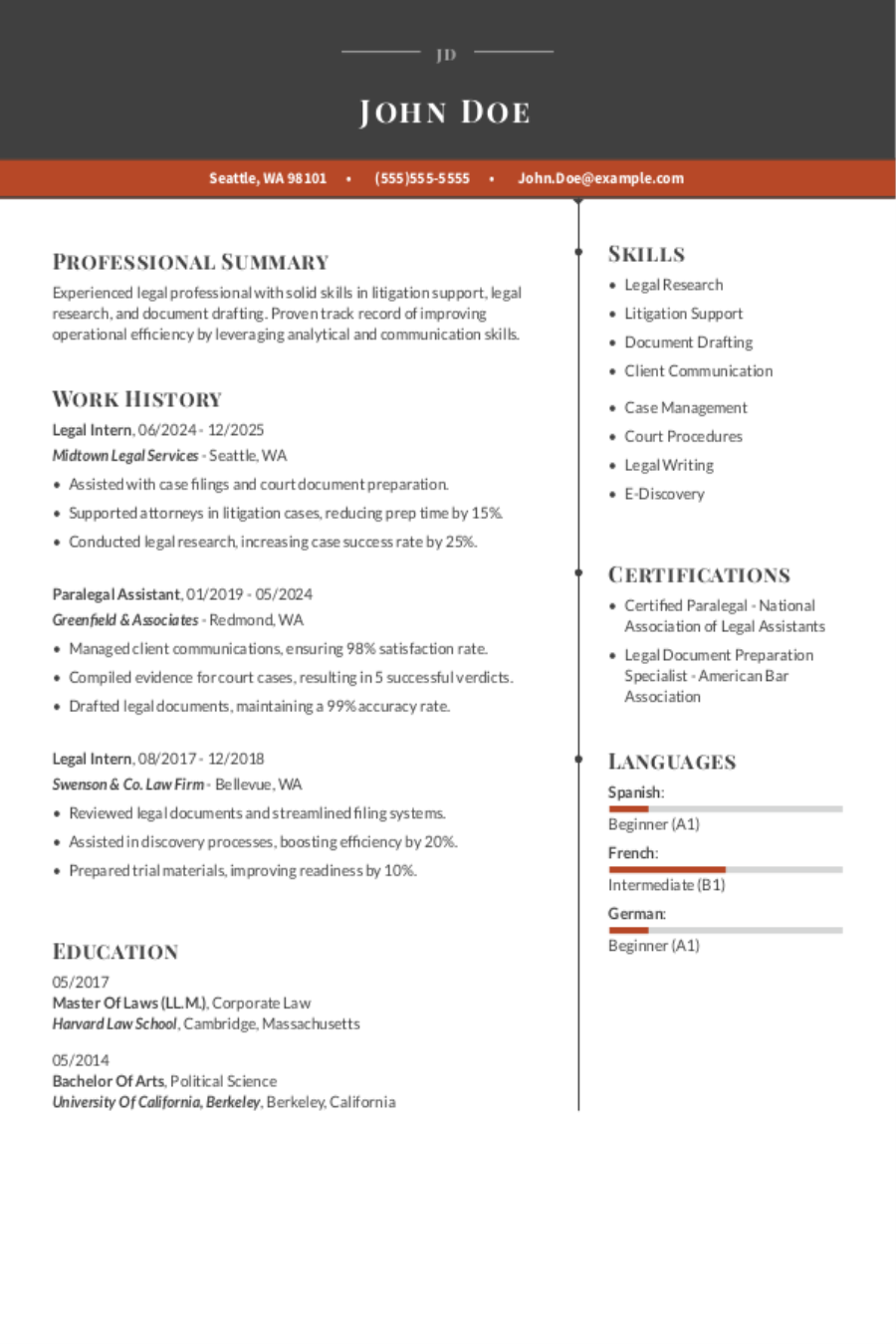Popular Skilled Trades Resume Examples
Entry-level skilled trades resume
An entry-level resume for skilled trades should emphasize relevant training, certifications, hands-on experience from apprenticeships, and essential skills like problem-solving and attention to detail.
Showcases education: This resume builds the candidate’s credibility by placing a strong focus on their educational background, establishing their expertise despite limited experience.
Places skills over experience: By using a functional resume format, this resume showcases technical skills, such as HVAC installation and project management, which are important for this role, rather than focusing solely on limited work history.
Mid-career skilled trades resume
A mid-career skilled trades resume should emphasize a comprehensive mix of hands-on experience, technical skills, and ongoing professional development to effectively demonstrate expertise and adaptability in the industry.
Employs active language: Using action verbs such as "boosted," "completed," and "trained" illustrates a proactive approach in driving results and fostering growth within the skilled trades field.
Includes mix of skills: This resume effectively highlights a mix of technical expertise and interpersonal skills, demonstrating the job seeker's comprehensive capabilities in the skilled trades field.
Experienced skilled trades resume
A resume for an experienced skilled trades professional should highlight specific skills, certifications, and achievements that demonstrate their expertise and career growth in the industry.
Quantifies achievements: Quantifiable achievements, such as managing over $2 million in budgets or improving safety compliance by 15%, provide clear evidence of this job seeker's capabilities. These metrics allow recruiters to quickly assess the impact and effectiveness of their work.
Optimized for ATS: The resume uses a clean template that harmonizes a professional header with an ATS-friendly resume layout, ensuring clarity and compatibility for both human recruiters and automated systems.
No experience skilled trades resume
A resume for an applicant with no experience in skilled trades should highlight relevant skills, certifications, and any hands-on projects to showcase the applicant's potential and commitment to the field.
Overcomes lacking experience: Incorporating volunteer experience helps this resume showcase their foundational knowledge. This effectively addresses any lack of extensive work experience while showcasing readiness for practical applications.
Emphasis on professional skills: Emphasizing skills like problem-solving and basic carpentry showcases the job seeker's readiness for skilled trades roles, despite limited hands-on experience through volunteer work.
Skilled Trades Resume Template
Looking to create a standout application? Start with this skilled trades resume template and easily tailor it to highlight your unique skills and experiences.
Emily Davis
Riverview, FL 33588
(555)555-5555
Emily.Davis@example.com
Professional Summary
Experienced skilled trades professional with expertise in equipment maintenance, electrical systems, and team training. Proven track record of reducing costs and improving efficiency. Fluent in Spanish, with certifications in safety and compliance.
Work History
Skilled Trades
BrightPath Caregiving - Riverview, FL
January 2023 - November 2025
- Maintained equipment with 99% uptime.
- Trained five new associates, improving team efficiency.
- Reduced operational costs by 15% annually.
Maintenance Specialist
Summit Freight Lines - Riverview, FL
January 2020 - December 2022
- Performed repairs on 100+ vehicles monthly.
- Implemented safety protocols, decreasing accidents by 20%.
- Streamlined maintenance processes, saving $10,000/year.
Repair Technician
Horizon Logistics - Miami, FL
January 2018 - December 2019
- Conducted inspections on fleet, ensuring 95% compliance.
- Serviced electrical systems, reducing downtime by 30%.
- Managed inventory, decreasing supply costs by 12%.
Skills
- Equipment Maintenance
- Mechanical Repair
- Electrical Systems
- Inventory Management
- Safety Protocols
- Team Training
- Cost Reduction
- Compliance Assurance
Certifications
- Certified Maintenance Manager - International Maintenance Institute
- Electrical Safety Compliance - National Electrical Contractors Association
Education
Master's Degree Mechanical Engineering
State University Springfield, IL
May 2018
Bachelor's Degree Industrial Technology
City College Springfield, IL
May 2016
Languages
- Spanish - Beginner (A1)
- German - Intermediate (B1)
- French - Beginner (A1)
Writing Your Skilled Trades Resume
Having explored various resume examples, you're now prepared to dive into the essentials of how to write a resume. We’ll guide you through each section carefully, ensuring you create a compelling presentation of your skills and experience.
List your most relevant skills
An effective skills section on your skilled trades resume should focus on both technical abilities, such as electrical work or plumbing expertise, and valuable soft skills like teamwork and adaptability. These elements demonstrate your readiness for the role and paint a complete picture of what you bring to the table.
To maximize your chances with recruiters and applicant tracking systems (ATS), make sure to incorporate keywords from the job listing into your skills section. This strategy not only helps human readers see how well you fit their needs but also boosts your visibility in ATS screenings, ensuring that you stand out as a qualified job seeker who meets their criteria.
Example of skills on a skilled trades resume
- Proficient in using a variety of tools and machinery for hands-on projects
- Adept at interpreting blueprints and technical drawings with precision
- Strong communicator who thrives in collaborative work environments
- Resourceful thinker committed to ongoing learning and skill development
A strong skills section is important for skilled trades positions, as it signals your readiness to take on the job's responsibilities. Include both the technical skills specified in the job description and relevant soft skills to illustrate that you are fully equipped to meet the challenges of the role. This balanced approach will resonate with potential employers.
Highlight your work history
The work experience section of your resume offers a chance to highlight your achievements—specific projects or tasks where you excelled and made a difference. Use action verbs and quantify results when possible to demonstrate your impact clearly.
For each job entry, include important details such as your job title, the name of the employer, and the dates of employment. These elements help employers understand your background and assess qualifications quickly.
Example of a skilled trades work experience entry
- Maintenance Technician
ABC Construction - Denver, CO
January 2019 - Present - Execute various trades including plumbing, electrical, and carpentry with a focus on quality and safety standards
- Lead a team of 4 apprentices, providing hands-on training and mentorship that improved project efficiency by 30%
- Successfully managed multiple projects simultaneously, completing tasks on time and under budget while ensuring client satisfaction
- Use advanced tools and technology to improve work accuracy, reducing material waste by 15%
- Collaborate with contractors and clients to assess project needs, leading to repeat business and positive referrals
Quantifying achievements in skilled trades is essential for demonstrating your expertise and impact. For example, stating that you reduced installation time by 15% while maintaining quality standards showcases your efficiency and reliability, making you a valuable applicant to potential employers.
Include your education
The education section of your skilled trades resume should clearly list your credentials in reverse-chronological order, beginning with the most recent qualification. Include relevant diplomas, certifications, and degrees while omitting high school details if you have advanced training or a higher degree.
For ongoing education or incomplete programs, specify your highest completed level along with an anticipated graduation date. It can be helpful to include bullet points that showcase relevant coursework or skills acquired during your training.
Common certifications for a skilled trades resume
- Journeyman Electrician (JE) – National Electrical Contractors Association (NECA)
- Certified Welder (CW) – American Welding Society (AWS)
- HVAC Excellence Certification – HVAC Excellence
- Certified Plumbing Technician (CPT) – Plumbing-Heating-Cooling Contractors Association (PHCC)
Sum up your resume with an introduction
Creating a compelling profile section in your resume is essential for making a strong first impression on potential employers.
If you have significant experience in the skilled trades, a professional summary is the ideal choice for your profile. This format allows you to showcase your key accomplishments and relevant expertise right at the top of your resume. If you’re just starting out, write a resume objective that highlights your commitment to building your career.
Professional summary example
Dedicated foreman with over 10 years of experience in diverse construction environments. Demonstrated ability to improve project efficiency, reduce costs, and ensure high-quality workmanship. Proficient in electrical systems, plumbing installations, and HVAC maintenance, consistently exceeding client expectations through careful attention to detail and strong problem-solving skills.
Resume objective example
Enthusiastic construction applicant eager to apply hands-on experience and a strong work ethic to support a collaborative team environment. Aiming to use problem-solving abilities and attention to detail to improve project efficiency and contribute to high-quality workmanship in every task.
When crafting your resume profile for skilled trades positions, seize the chance to integrate relevant keywords from job descriptions. This section is important as it sets the tone for your qualifications and helps your application navigate through ATS systems. Tailoring your introduction ensures you highlight the skills that employers value most.
Add unique sections to set you apart
Optional resume sections can help you stand out as a job seeker in skilled trades positions by highlighting your unique qualifications. These sections allow you to showcase experiences and skills that may not fit into standard categories, giving employers a fuller picture of who you are.
Incorporating elements like relevant hobbies or volunteer activities can reveal important aspects of your professional persona. For instance, if you enjoy woodworking or contribute to community projects, these details demonstrate your commitment and passion for the trade.
Three sections perfect for a skilled trades resume
- Languages: In skilled trades, effective communication is important for teamwork and client relations. Highlighting your language skills on your resume can improve collaboration and expand your opportunities in diverse environments.
- Volunteer Work: Including volunteer work on a resume not only showcases your commitment to community service but also highlights valuable skills you've developed, making you a more attractive job seeker in the skilled trades.
- Accomplishments: In skilled trades, quantifiable accomplishments are vital for demonstrating your expertise and efficiency. Display these achievements by embedding them in your work experience or placing them in a standalone accomplishments section.
5 Resume Formatting Tips
- Choose a format that matches your career stage.
When selecting the resume format that best suits your career level, it's important to choose wisely. A chronological format is effective for highlighting your job history if you have extensive experience. For individuals who are new to the workforce, a functional resume can effectively showcase skills. If you want to seamlessly mix both experiences and skills, consider using a combination format.
- Pick a smart resume template.
Using a professional resume template improves readability and makes your skills stand out. A well-structured format allows hiring managers to quickly grasp your qualifications. If you opt for a custom design, keep it clean and choose fonts that are easy to read so your resume gets the attention it deserves.
- Select an appropriate font.
Choose a clear, professional font to improve your resume's readability. Opt for widely accepted options like Helvetica, Georgia, or Verdana so that both ATS and hiring managers can easily read your information.
- Use consistent formatting.
Align your resume to the left and maintain equal margins. This creates a neat layout that improves readability and presents you as a polished applicant.
- Keep your resume to one or two pages.
When creating your resume, remember that resumes should be one page long for most applicants. Keep your content concise and focused on the key information that highlights your skills and experiences effectively.
Tools for Your Job Search
Are you looking to land your next opportunity in skilled trades? Before you send off your application, take advantage of our ATS Resume Checker. This powerful tool provides you with valuable insights on how well your resume will perform against the automated systems that many companies use for initial applicant screening.
Need more personalized support? Our AI Resume Builder offers tailored recommendations specific to your skilled trades background, along with professional templates designed to make your technical skills and experience stand out to potential employers.
Frequently Asked Questions
Last Updated: November 21, 2025
Yes, a cover letter is important as it adds depth to your resume and creates valuable communication opportunities with employers. It allows you to express your enthusiasm for the skilled trades role and highlight how your unique experiences make you a strong applicant. So, take the time to write a cover letter that showcases your passion and qualifications.
For a quick and efficient way to create tailored cover letters, consider using our AI Cover Letter Generator. In just minutes, you can generate a compelling cover letter while choosing from various cover letter template options that perfectly match your resume, ensuring a polished presentation of your skills and experience.
A resume is a concise document, typically spanning one to two pages, focusing on your skills and experiences relevant to the job you’re applying for. In contrast, a CV (curriculum vitae) can extend several pages and includes detailed information about your academic achievements, research contributions, publications, and extensive professional experience.
You’ll generally need a CV when applying for positions in academia, science, law, or specialized fields. If you're unsure whether to use a resume or CV for your application, our online CV Maker can help you create tailored documents quickly. Select from various CV templates designed for different industries and career levels to ensure your application stands out.
To write a strong CV, start by organizing your information with clear headings like Contact Information, Work Experience, Skills, and Certifications. Opt for templates that are visually appealing and compatible with applicant tracking systems (ATS). Incorporate relevant keywords from the job posting to tailor your content for each job, ensuring your CV stands out.
In addition, reviewing CV examples from professionals in your field can offer valuable insights. Analyze how they present their qualifications and achievements to understand effective formatting and phrasing. This will give you ideas on how to elevate your own CV presentation.
A frequent error skilled trades professionals make is failing to tailor their resumes for ATS. Ensure your resume template is Ats-friendly by using standard formatting and relevant keywords from the job description. This increases your chances of getting noticed and landing that interview.
To excel in your skilled trades interview, practice job interview questions and answers. This preparation boosts your confidence and equips you to tackle any surprises.
Many skilled trades professionals begin as apprentices or helpers, gaining hands-on experience. With further training and certification, they can advance to journeyman positions or even become master craftsmen in their respective fields.
Was this information helpful? Let us know!
Keith is a Certified Professional Resume Writer (CPRW) and trusted media source in the career industry with over a decade of experience helping job seekers stand out.
More resources

What if I Don't Have Professional References?
Access advice on what to do if you get to the reference check ...

The Most Dangerous Jobs in America: Some Pay Less Than $40K, Others Top $190K
Resume Now s report reveals the highest and lowest paying dang...

How to Write a Resume: Guide & Examples for 2025
If you re wondering how to write a resume that grabs attenti...

Music Resume: Examples, Templates & Tips
Get inspired with our music resume examples as well as templat...

Psychology Resume: Examples, Templates and Tips
Planning to pursue a psychology career? Let our samples templ...


